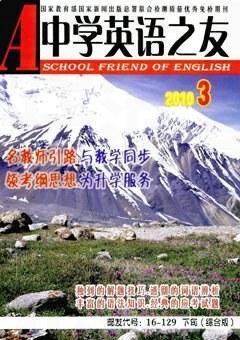“反意疑问句”总动员
毛 桦
反意疑问句是人教版Go for it八年级下册要学的语法项目,也是各类英语测试爱考察的语法现象之一。不少同学觉得自己的反意疑问句学得还可以,但考试时总是出问题,这种情况反映了我们对反意疑问句的理解还不够。
反意疑问句是提出自己的主张或看法,问对方同不同意。这种问句有两部分组成,前一部分是陈述句(A),后一部分是附着在前一部分上的简略问句(B),简略问句的否定形式必须用缩写形式,主语只能用人称代词,而不能用名词。前后两部分在人称、时态和数上一定要保持一致。
反意疑问句的构成分两类:1. (A)肯定+(B)否定 2. (A)否定+(B)肯定。
反意疑问句前一部分要读成降调,后一部分读成升调较多,如果说话人坚信前一部分说的是事实,后一部分也可以用降调。
一、请看下列句子:
(1)The wall is white, isnt it?
(2)They were here yesterday, werent they?
(3)You wont be away for long, will you?
(4)Kate is riding, isnt she?
(5)Our head teacher is loved by all of us, isnt he?
(6)You are not going out today, are you?
以上句子都是含有be的反意疑问句,无论句子是什么时态或什么语态,都符合以上规则。
二、下面再来谈谈含有实义动词的反意疑问句:
(1)He likes English, doesnt he?
(2)The old lady helped me, didnt she?
(3)The Greens will visit the Great Wall, wont they?
(4)Miss Hua has taught here for twenty years, hasnt she?
(5)You dont study French, do you?
(6)She didnt raise many questions, did she?
在含有实义动词的反意疑问句中,千万要注意前后两部分在人称(名词或代词)、时态和数(单/复数)上要保持一致。
三、含有情态动词的反意疑问句。
Lily cant swim, can she?
We must finish the homework, mustnt we?
如果陈述句部分含有have to 或has to时,疑问句部分要用do或 did。
(1)We have to go there on foot, dont we?
(2)The workers had to get up early, didnt they?
四、在反意疑问句中,如果陈述句部分含有no, never, little, few, hardly, seldom, nobody, no one, nothing, neither, scarcely等词,陈述句部分就等同于否定句,简略问句就要用肯定形式。
(1)He never drinks coffee, does he?
(2)You were hardly twenty then, were you?
(3)Very few people understand what he said, do they?
(4)We have nothing against it, do we?
在这类句子中,我们还要注意dislike, hate这样的词,它们虽然含有否定的意思,但是当它们用于陈述句部分时,仍然要把陈述句部分看作肯定句,所以疑问句部分要用否定形式。
(1)She dislikes animals, doesnt she?
(2)They hate this kind of plays, dont they?
五、其它类型的反意疑问句。
(一)祈使句的反意疑问句:
在肯定的祈使句后,为了使句子听起来比较委婉客气,可加上一个简短的问句,如:“will you?”, “wont you?”, “can you?”, “cant you?”, “couldnt you?”,“would you?”。最常用的是“will you?”或“wont you?”。
(1)Speak loudly, will you?
(2)Give me a hand, wont you?
(3)Be careful, can you?
(4)Read it slowly, cant you?
在否定的祈使句后,只能用肯定的疑问部分“will you?”。
(1)Dont be late, will you?
(2)Dont make so much noise, will you?
注意在含有Lets和Let us祈使句的反意疑问句中,Lets后的疑问部分是“shall we?”或“shant we?”,因为Lets包含说话者在内。而在Let us要用“will you?”或“wont you?”,因为Let us不包括说话者在内。
(1)Lets go home, shall we?
(2)Let us discuss the question, will you?
(二)含有There be的反意疑问句:
陈述句部分如果含有There be结构,疑问部分仍用there,但是要省略主语。
(1)There is a bird in the tree, isnt there?
(2)There wont be any classes next week, will there?
(三)主语是不定代词的反意疑问句:
如果陈述句部分的主语是everything, nothing, something等表示事物的不定代词时,疑问部分的主语要用it来代替陈述句中的不定代词;如果陈述句部分的主语是 everyone, no one, someone等表示人的不定代词时,疑问部分的主语用they,(有时也用he)来代替陈述句中的不定代词。
(1)Everything goes well now, doesnt it?
(2)Everyone knows the brave boy, dont they?
(3)Nothing can stop him learning English, can it?
(4)Something is wrong with your computer, isnt it?
(四)宾语从句的反意疑问句:
宾语从句的反意疑问句除了适用反意疑问句的一般规则外,还要注意在后一部分的简略问句中的主语,要与宾语从句中的从句的主语保持一致。
(1)I think he is a good student, isnt he?
(2)We dont suppose she cares, does she?
六、反意疑问句的回答:
在回答反意疑问句时我们千万要注意,如果答案是肯定的,要毫不犹豫地用yes,反之用no。
(1)Dick goes to school by bus, doesnt he?
Yes, he does./No, he doesnt.
(2)Tom has lived there for over five years, hasnt he?
Yes, he has./No, he hasnt.
特别要提醒的是:当前一部分的陈述句是否定时,英语的回答和汉语的回答是不一致的。
(1)You are not going shopping today, are you? 你今天不去购物了,是吗?
No, I am not. 是的,我今天不去了。
Yes, I am. 不,我今天要去买东西。
(2)You dont study Japanese, do you? 你们不学日语,是吗?
No, we dont. 是的,我们不学日语。
Yes, we do. 不,我们学日语。

